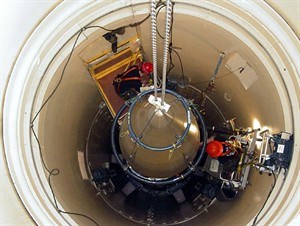
FILE - In this undated file image released by the U.S. Air Force, a Malmstrom Air Force Base missile maintenance team removes the upper section of an ICBM at a Montana missile site. The Air Force is court-martialing a nuclear missile launch officer on drug and obstruction-of-justice charges stemming from a criminal investigation that led to the disclosure last winter of a separate exam-cheating scandal that implicated nearly 100 nuclear officers. (AP Photo/U.S. Air Force, John Parie, File)
Republished December 02, 2014 - 9:18 PM
Original Publication Date December 02, 2014 - 12:35 PM
WASHINGTON - The U.S. Air Force is court-martialing a nuclear missile launch officer on drug and obstruction-of-justice charges stemming from a criminal investigation that led to the disclosure last winter of a separate exam-cheating scandal that implicated nearly 100 nuclear officers.
2nd Lt. Nicole Dalmazzi of the 341st Missile Wing at Malmstrom Air Force Base, Montana, is the first missileer, as launch officers are known, known to have been charged since the drug investigation was made public in January on the same day Defence Secretary Chuck Hagel visited the headquarters of the Air Force's land-based nuclear missile force.
The twin disclosures of alleged exam cheating and illegal drug use accelerated a wave of embarrassing news about the nuclear missile corps, which has been beset with discipline problems, low morale, leadership lapses and resource shortages. Last month Hagel announced plans for top-to-bottom changes in how the force is managed and operated. Ten days later he resigned, although Air Force officials say they are confident the reforms will move ahead.
Dalmazzi was charged with illegal drug use and obstructing the Air Force Office of Special Investigations probe by dyeing her hair to "alter the results of potential hair-follicle drug tests," according to Josh Aycock, a spokesman at Malmstrom. He would not elaborate on her alleged actions or the tests. He said her court martial is scheduled for Jan. 21.
Efforts to reach Dalmazzi for comment Tuesday were unsuccessful. As a missileer she is trained to operate the Minuteman 3 missile, which is armed with a nuclear warhead and stands ready for launch on short notice from an underground silo that is electronically linked to a launch control centre, also underground, where two missileers are on duty around the clock.
Because of the sensitive nature of the job, with its many classified procedures and potential for costly mistakes, any allegation of drug use by missileers is concerning. A RAND Corp. report last year on workplace stresses for missileers and others in the nuclear missile corps found some suffering "burnout." It also found an elevated rate of behavioural issues, including domestic violence.
Dalmazzi's 341st Missile Wing at Malmstrom operates 150 of the Air Force's 450 Minuteman 3 intercontinental ballistic missiles, or ICBMs. The other 300 are evenly divided between Minot Air Force Base in North Dakota and F.E. Warren Air Force Base in Wyoming. The Air Force also operates a fleet of nuclear-capable bomber aircraft.
Of four missileers who were subjects of the drug investigation, three were at Malmstrom and one at F.E. Warren. The investigation began in August 2013 at Edwards Air Force Base in California. When investigators examined the cellphones of two airmen at Edwards they found text messages to or from 11 other Air Force officers at several other air bases.
The text messages detailed "specific illegal drug use that included synthetic drugs, ecstasy, and amphetamines," according to a report released in March that looked mainly at missileers' exam cheating but also traced a connection between the drug and cheating issues.
Two of the 11 officers were assigned to Malmstrom; investigators determined that both had used personal cellphones to discuss illegal drug activity as well as answers to routine proficiency tests taken by all missileers, according to the Air Force investigation report released in March. That investigation focused on the exam cheating, whereas the drug probe was done separately as a criminal inquiry by the Office of Special Investigations, which has not publicly announced its results.
Eventually the number of Malmstrom missileers implicated in the drug probe grew to three.
The Air Force concluded that the exam cheating was confined to missileers at Malmstrom. Disciplinary action for the alleged cheating is being handled separately from the drug cases, although the Air Force has said that three officers at Malmstrom who were suspected of illegal drug activities also were alleged to have shared classified exam materials.
In an Associated Press interview Tuesday, Air Force Secretary Deborah Lee James said the OSI criminal probe is complete.
"We've made a big point about accountability," James said. "Standards are standards, and when people fail in integrity, service and excellence there are appropriate accountability measures. We've made a big point of that and that's true across the Air Force and it has been, of course, particularly true this past year in the ICBM community."
___
Follow Robert Burns on Twitter at http://www.twitter.com/robertburnsAP
News from © The Associated Press, 2014